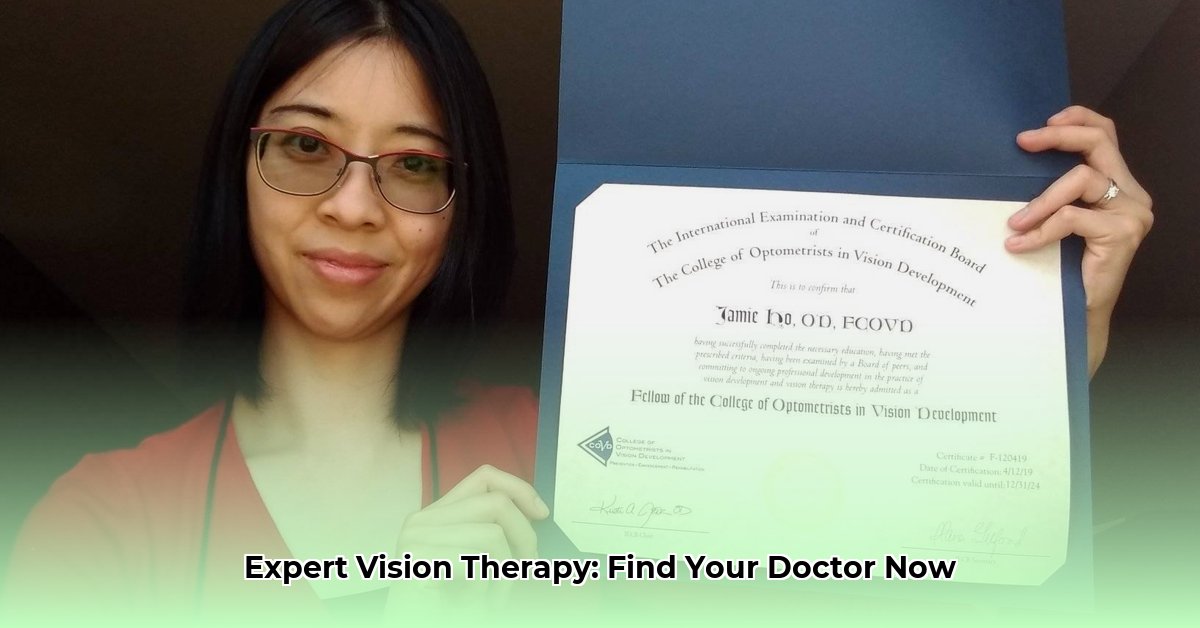Choosing the right eye doctor can be tricky, especially if you need vision therapy. This guide simplifies things by explaining the difference between FAAO and FCOVD certifications – two important markers of expertise in this field. We’ll break down what each certification means, help you understand which is best for your needs, and even show you how to find an optometrist with the right credentials. Whether you’re a patient looking for top-notch care or an optometrist wanting to boost your career, this guide provides clear, practical information to help you make the best choices. For more on choosing the right type of doctor, check out this helpful guide on family vs. general practice.
FCOVD: Your Key to Finding Expert Vision Therapists
Finding the right eye doctor can be tough. But if you’re dealing with vision problems that go beyond needing glasses, you might need a specialist in vision therapy. That’s where the FCOVD certification comes in – it’s a big deal in vision development.
What Does FCOVD Certification Really Mean? Understanding the Expertise
FCOVD stands for Fellow of the College of Optometrists in Vision Development. It’s not just a title; it shows a commitment to advanced vision care. These aren’t your average eye doctors; these optometrists have spent years getting specialized training in vision therapy (a treatment plan to improve visual skills). They’re experts in treating vision problems that regular eye exams might miss. Think of them as the vision therapy all-stars, dedicated to improving visual skills and visual processing.
Becoming an FCOVD requires a minimum of five years of experience, attendance at continuing education courses focused on vision therapy, submission of written work, mentorship from an experienced vision therapy doctor, and successful completion of an oral interview.
Why Choose an FCOVD Optometrist? Benefits of Seeing a Specialist
Why is the FCOVD certification so significant? Because it means you’re getting care from someone with a proven track record of helping people with complex vision issues. They’re not just correcting blurry vision; they understand how vision problems can affect learning, behavior, and even your overall well-being. FCOVD optometrists have spent years in specialized training, completing over 100 hours of advanced educational coursework covering topics such as binocular vision, visual information processing, and vision therapy techniques.
It’s like this: a regular doctor can treat many health problems, but you’d see a specialist for something complicated, right? An FCOVD optometrist is that specialist for your eyes and vision. They’re equipped to handle the more intricate aspects of vision, offering tailored treatments and a deeper understanding of complex visual problems.
Finding Your FCOVD Optometrist: A Step-by-Step Guide on How to Locate and Secure an Appointment
Ready to find an FCOVD optometrist? It’s easier than you think. Follow these steps:
- Search the COVD Directory: The College of Optometrists in Vision Development (COVD) has an online directory. You can easily search for FCOVD certified doctors near you, filtering by location and other details.
- Ask Your Doctor for a Referral: Your family doctor or ophthalmologist may know an FCOVD optometrist in your area and can provide a referral. This can streamline the process and potentially expedite your appointment.
- Check Your Insurance Coverage: Before you go, call your insurance company to make sure your plan covers visits to an FCOVD optometrist. This will prevent unexpected costs. You should clarify the extent of their coverage for vision therapy services, especially considering the specialized nature of the care.
- Consider Telehealth Options: Many FCOVD optometrists now offer telehealth consultations, expanding access to specialized care regardless of your location.
FCOVD vs. FAAO: What’s the Difference? Comparing Optometric Specialists
You might hear about another certification: FAAO (Fellow of the American Academy of Optometry). While both FCOVD and FAAO certifications signify a commitment to advanced knowledge, their focus differs. FAAO optometrists have demonstrated knowledge of the latest advancements in their area of expertise and a commitment to lifelong learning in eye care. The FAAO requires submitting written and published work and passing an oral interview before a panel of doctors.
| Certification | Primary Focus |
|---|---|
| FCOVD | Vision development and vision therapy |
| FAAO | General optometry, research, and broader eye health |
Think of it like this: an FAAO optometrist is a highly skilled general optometrist, while an FCOVD optometrist specializes in vision therapy. Both are excellent choices, depending on your needs, but cater to different areas of expertise.
Addressing Your Vision Therapy Questions: A Practical Guide Addressing Common Concerns
If you’re considering vision therapy, you probably have some questions. Let’s address a few common ones:
- What if my insurance doesn’t cover an FCOVD optometrist? While insurance coverage is ideal, many FCOVD optometrists offer payment plans or can provide information on financial assistance options. You can also contact the COVD for suggestions on practitioners who participate in your insurance network. Additionally, consider using a health savings account (HSA) or flexible spending account (FSA) to cover vision therapy expenses.
- How do I know if vision therapy is right for me? If you’re experiencing vision problems that affect your daily life, such as reading difficulties, headaches, or eye strain, it’s worth discussing vision therapy with your doctor or an optometrist. They can assess your condition and determine if it’s a good option for you.
- What should I expect during vision therapy? Vision therapy involves personalized programs. These might include eye exercises, specific activities, and strategies to improve your vision skills. The process is tailored to your individual situation. It’s all about working with your therapist to improve your overall visual capabilities.
- How long does vision therapy take? The duration of vision therapy varies depending on the individual’s needs and the complexity of their vision problems. It can range from a few months to a year or more. Your FCOVD optometrist will be able to provide a more accurate estimate after evaluating your specific case.
The Long-Term Benefits of Specialized Vision Care and Improved Visual Skills
Investing in your eye health can have significant positive impacts on your daily life and overall well-being. An FCOVD optometrist can be a valuable resource. They don’t just diagnose problems; they create a personalized path for you to improve your vision and quality of life. Don’t hesitate to explore this option if you suspect your vision may need specialized care. It could make a significant difference, with many patients reporting improvements in reading, focus, and overall comfort after undergoing vision therapy.
How to choose between FCOVD and FAAO certifications for optometrists
Finding the right optometrist is crucial, especially for vision therapy. Two prominent certifications often come up: FCOVD and FAAO. But what’s the difference, and which is right for you in addressing your specific vision care needs?
Key Takeaways:
- Both FCOVD and FAAO represent advanced training and expertise beyond a basic optometry degree.
- FCOVD specifically focuses on vision development and therapy.
- FAAO signifies broader excellence across various areas of optometry.
- The choice depends on your specific vision needs.
Understanding FCOVD and its emphasis on visual skills
The FCOVD (Fellow of the College of Optometrists in Vision Development) certification is your signal for specialized expertise in vision therapy. Think of it as a specialized training path focused on improving visual skills. These doctors undergo rigorous training including extensive clinical hours (1000+), continuing education dedicated to vision development, and comprehensive examinations. They’re the go-to experts for conditions like amblyopia (lazy eye), strabismus (crossed eyes), and convergence insufficiency, emphasizing the importance of visual skills in overall eye health.
Need help with vision therapy? An FCOVD optometrist is your best bet, offering targeted treatments to enhance visual skills and address specific vision-related challenges.
Understanding FAAO and its comprehensive optometric knowledge
The FAAO (Fellow of the American Academy of Optometry) designation is a broader marker of excellence in the field of optometry overall. It signifies a commitment to advanced knowledge and skills across a wider range of optometric specialties. While not exclusively focused on vision therapy, FAAO fellows often possess a high level of skill and knowledge in the area, contributing to a comprehensive approach to eye care. Earning the FAAO designation demonstrates a commitment to teaching, research, and education in optometry.
It’s like the difference between a general practitioner and a specialist. FAAO is like the general practitioner of optometry, offering a broad base of knowledge and skill, while still maintaining high standards of patient care.
Choosing the Right Certification for Your Needs in Vision Therapy
So, how to choose between FCOVD and FAAO certifications for optometrists? The answer hinges on your specific needs:
- Vision Therapy Needs: If you or your child requires vision therapy, an FCOVD-certified optometrist is your best choice. Their focused training ensures they possess the specialized skills and knowledge to address these complex vision issues.
- General Eye Care: If you need general eye exams, prescriptions, or basic eye health care, an FAAO optometrist is an excellent choice. Their broad expertise assures comprehensive care. Many FAAO optometrists also possess additional skills in vision therapy, but it
- Compartment Food Containers Make Meal Prep and Lunch Packing Easy - February 10, 2026
- Divided Lunch Containers Revolutionize Your Meal Prep Strategy - February 9, 2026
- Divided Food Storage Containers Transform Meal Prep and Portion Control - February 8, 2026










